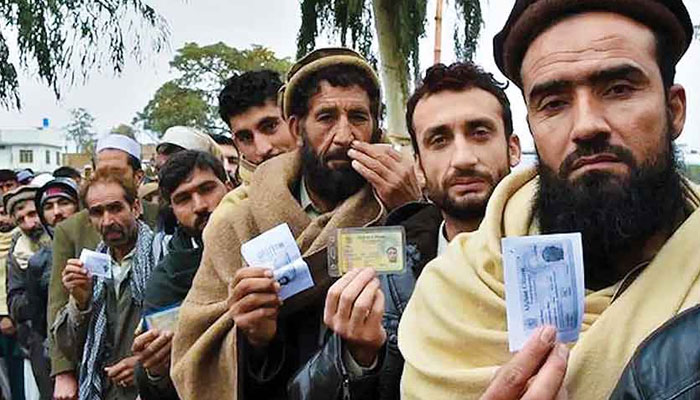[Comment] From hospitality to hard choices: Easing Rs100bn monthly burden
An ‘illegal refugee’ is a term used to describe an individual who seeks refuge in a country but does not have the necessary legal documentation or authorization to enter or stay in that country. This person is typically in violation of the country’s immigration laws and may face deportation or legal consequences for their unauthorized presence.
Here’s a partial list of countries that are known for enforcing strict immigration laws and deporting individuals who are in their country without proper documentation: United States, Canada, Australia, France, Germany, Italy, Spain, Sweden, Norway, Denmark, Netherlands, Belgium, Greece, Switzerland, Austria, Portugal, Ireland, Finland, New Zealand, Israel, Japan, South Korea, Singapore, United Arab Emirates, Saudi Arabia, Qatar, Kuwait, Bahrain and Turkey.
On October 3, Pakistan issued an order requiring all undocumented immigrants, which includes 1.73 million Afghan nationals, to depart from Pakistan voluntarily by November 1, or they could face deportation. Notably, Pakistan is currently hosting a total of 4.4 million Afghan refugees, with 1.73 million of them being in an undocumented status. Interior Minister Sarfraz Bugti reported that out of the 24 suicide bombings that occurred in Pakistan this year, 14 were attributed to Afghan nationals.
With a substantial Afghan refugee population, which includes a significant number of undocumented or unauthorized migrants, Pakistan faces various economic challenges. These refugees place considerable demands on Pakistan’s essential services, such as healthcare, education, and public housing. Consequently, this situation has resulted in overcrowded schools and healthcare facilities, potentially placing a strain on the resources designated for these critical services.
Afghan refugees compete in the labor market, potentially leading to lower wages and less favorable working conditions for both refugees and host country nationals. This has led to wage suppression and job displacement in certain sectors.
To be certain, hosting a significant refugee population requires resources for security and public safety especially when some of these refugees are involved in illegal or criminal activities. This refugee population has strained local infrastructure, including roads, utilities and sanitation.
Rarely does any nation extend the hospitality of permanent settlement to a refugee population of such significant magnitude, but Pakistan did, and it has not been without its challenges. The monthly economic toll of hosting this substantial refugee community is estimated at approximately Rs100 billion a month, every month of the year.
Moreover, this financial burden doesn’t even encompass the immense losses, both foreign and domestic, which have accumulated in the wake of acts of terrorism. The lack of prior action by any Pakistani government in this regard raises a significant question. Yes, executing mass deportations presents an immense challenge.
In conclusion, the presence of a substantial Afghan refugee population has imposed tremendous economic burdens on Pakistan. These burdens manifest in the form of strained healthcare, education, and housing services, leading to overcrowded facilities and dwindling resources. Moreover, the competition in the labor market has resulted in wage suppression and job displacement, affecting both refugees and the host country’s nationals.
Additionally, the strain on security, public safety and local infrastructure, along with the monthly economic cost estimated at approximately Rs100 billion, underscores the pressing need to address this issue. Rarely has any nation sustained the hospitality of permanent settlement for a refugee population of this magnitude, yet Pakistan has done so, despite the multifaceted challenges it entails. The call for mass deportations is a reflection of the urgency to alleviate these economic burdens and ensure the welfare and stability of the nation.
-
 Paul Anka Reveals How He Raised Son Ethan Differently From His Daughters
Paul Anka Reveals How He Raised Son Ethan Differently From His Daughters -
 'A Very Special Visitor' Meets Queen Camilla At Clarence House
'A Very Special Visitor' Meets Queen Camilla At Clarence House -
 Jodie Turner Smith Shares One Strict Rule She Follows As A Mom
Jodie Turner Smith Shares One Strict Rule She Follows As A Mom -
 Hailey Bieber Reveals KEY To Balancing Motherhood With Career
Hailey Bieber Reveals KEY To Balancing Motherhood With Career -
 Photo Of Jay-Z, Other Prominent Figures With Jeffrey Epstein Proven To Be Fake
Photo Of Jay-Z, Other Prominent Figures With Jeffrey Epstein Proven To Be Fake -
 Hillary Clinton's Munich Train Video Sparks Conspiracy Theories
Hillary Clinton's Munich Train Video Sparks Conspiracy Theories -
 Fans Slam Talk Show Host For 'cringe' Behavior In Chris Hemsworth Interview
Fans Slam Talk Show Host For 'cringe' Behavior In Chris Hemsworth Interview -
 Woman Jailed Over False 'crime In Space' Claim Against NASA Astronaut
Woman Jailed Over False 'crime In Space' Claim Against NASA Astronaut -
 James Van Der Beek’s Close Pal Reveals Family's Dire Need Of Donations
James Van Der Beek’s Close Pal Reveals Family's Dire Need Of Donations -
 Prince William And Harry's Cousins Attend 'Wuthering Heights' Event
Prince William And Harry's Cousins Attend 'Wuthering Heights' Event -
 Hailey Bieber Turns Heads Just Hours After Major Business Win
Hailey Bieber Turns Heads Just Hours After Major Business Win -
 King Charles' Andrew Decision Labelled 'long Overdue'
King Charles' Andrew Decision Labelled 'long Overdue' -
 Timothee Chalamet 'forever Indebted' To Fan Over Kind Gesture
Timothee Chalamet 'forever Indebted' To Fan Over Kind Gesture -
 Columbia University Sacks Staff Over Epstein Partner's ‘backdoor’ Admission
Columbia University Sacks Staff Over Epstein Partner's ‘backdoor’ Admission -
 Ozzy Osbourne's Family Struggles Behind Closed Doors
Ozzy Osbourne's Family Struggles Behind Closed Doors -
 Dua Lipa Claims Long-distance Relationship 'never Stops Being Hard'
Dua Lipa Claims Long-distance Relationship 'never Stops Being Hard'




